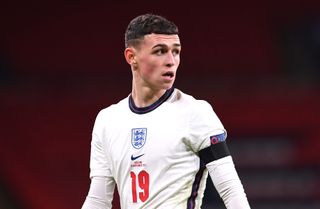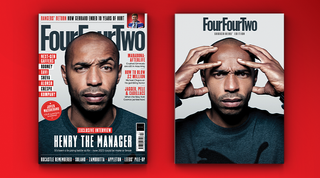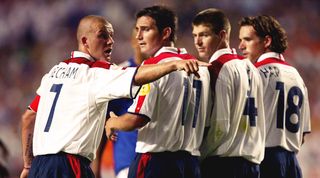England's creative renaissance provides an opportunity to compete with the best at Euro 2020
A clutch of young players to rival any gives England a chance to go toe to toe with Euro 2020's big guns

A renaissance. French for ‘rebirth’. A period of history donned with marking the start of the modern age. A thirst of learning, born from the study of ancient times of Greece and Rome, to propel themselves forward culturally, scientifically and artistically. It was a wave that would stretch across Europe and widen perspective more than ever before.
Football has become maligned for its lack of creativity and flair in these contemporary times. It was a criticism that has been levelled on the shores of England for as long as many could remember. After an exit in yet another international tournament, the talk would inevitably turn to the fact that the technical capability the opponents display is one that the English players are just unable to match. A criticism even levelled at the famed Golden Generation as they continually came up short in these competitions, between 2002 and 2010.
EVERYTHING YOU NEED TO KNOW Euro 2020: new dates, venues, tickets information, coronavirus protocols, and groups
Finally, it seems, a generation of dexterous footballers has been cultivated. From the push of the England DNA, the Elite Performance Plan of the Premier League, along natural cultural phenomena where the Hackney Marshes had finally been replaced with the concrete cages these young boys had their footballing education shaped by. Raheem Sterling, Marcus Rashford, Jadon Sancho, Callum Hudson-Odoi, James Maddison, Jack Grealish, Phil Foden, Mason Mount, Bukayo Saka, Mason Greenwood are just some of the names that come to mind when it comes this newer generation. One wonders how Gareth Southgate will be able to balance all of these players.

IN THE MAG Thierry Henry exclusive! Plus Rangers, Rocastle, Mascherano, Maradona, Chopra, Appleton and more
This isn’t a new problem in England. Contrary to popular belief, England have had a roster of technically gifted footballers before. The 1980s and 90s saw a lot of England’s midfielders and attackers at the disposal of the then managers of the national team. Glenn Hoddle, Paul Merson, Chris Waddle, Matt Le Tisser, John Barnes, Paul Gascoigne, Peter Beardsley among them spanning across these decades. Due to a number of external factors, a lot of these players would ply their trade on the continent, something that became quite a novelty for later English internationals until the younger generation more recently, headed by Jadon Sancho’s venturing to Dortmund.
A lot of those names, the form that was being shown for their club teams was something that was not replicated within the England set-up. It was a cultural misfit as the managers found it hard to revolve a system around technical players who lent less on the running and passion so attributable to England’s style of play. Harking back to Hoddle, after his emergence in the Tottenham Hotspur side that was centred around him, he would go on to lead the team to promotion and then two FA Cups in 1981 and 1982. It was what would take him to the World Cup in 1982. However, it would take Bryan Robson being injured for the Spurs legend to make appearances during the World Cup and he would not feature once England qualified from the group stages, which they duly bowed out after two goalless draw in the then Second Round group stage.
EURO 2020 What questions does Gareth Southgate's latest England squad raise?
Get FourFourTwo Newsletter
The best features, fun and footballing quizzes, straight to your inbox every week.
The creators were revered on the continent, much like the artists, poets and sculptors in the Renaissance era. The Fantasista, as they were named in Italy. Making the fantasy of the play that would get the goal. It was not a fantasy in England.
Almost 40 years later, generations have passed but a similar problem presents itself. The sheer abundance of talent makes it so that surely it cannot be another tournament whereby the attacking options are stifled in accordance to a manager’s favoured system? While the result of it may be the same, the thinking behind it comes from a different place. Rather than it being because of a fear behind what was not understood, it may be through a fear of what has been seen before and not doing what the best do currently.

The aforementioned Golden Generation, one that would see English teams dominate the continent, were a team believed to be stunted by its insistence in sticking players into a system that couldn’t fit the best of them. It needed sacrifice. Particularly in the midfield, where perhaps the best talent lay. The infamous Steven Gerrard-Frank Lampard debate, Scholes’ failure in the Three Lions shirt culminating in his shunting to left midfield and the lack of a natural holding midfielder, when Carrick and Hargreaves were both capable. It is a wonder why Southgate may perhaps be reluctant to fall into this same trap.
The ex-Middlesbrough and England U21 manager may be going the complete other way, however. A team blessed with as many attackers and creators as this crop shouldn’t have to be shoehorned into a formation that employs 3 men at the back. International football does not allow for the same meticulous and bespoke innovations you see in managerial setups like Tuchel’s Chelsea and Pep’s Man City. As deep as England went with Southgate in the last World Cup, this was prior to a lot of these players’ emergence on the scene. The proliferation of technically gifted English talent within the last two years has been quite remarkable.
ENGLAND EURO 2020 SQUAD The complete line-up for March's internationals
A front two of Kane and Sterling, with Alli, Lingard and Henderson behind them may have washed with England going into a tournament as relative underdogs but it cannot wash now. Outside of Portugal and France, England are seen as a dominant force. Why make it a competition between Grealish and Rashford, for example, when both could theoretically play? Are three centre backs really needed when there are enough players for a proactive style of play now? These are just some of the questions to ask of the incumbent manager.
The Renaissance Man is Leonardo da Vinci because of his great knowledge and ability of many great things. In a way, when the England DNA manifesto was laid out, the hopes was to create a system where any 11 would all be Renaissance Men. ‘Tactically aware, athletic, creative, intelligent players” as detailed in 2014. In many ways, you can say it has been successful in creating such. Now is not the time to let old ways to become roadblocks to fulfilling such potential.
There is a rebirth of a time where England are boasting some of the most technically able players in the world, while maintaining the athleticism always present within its game. The foreign clubs have been looking to poach these youngsters that came through the English system more and more, which is a testament to its quality. Like the Renaissance, England should use what has happened in the past to propel themselves forward. The artists we have should be put on the same pedestal as they have been on the continent. The continental tournament of the European Championships would be the best place for Southgate to hopefully start.
Subscribe to FourFourTwo today and get your first five issues for just £5 for a limited time only - all the features, exclusive interviews, long reads and quizzes - for a cheaper price!
READ MORE
FEATURE What kind of manager is Xabi Alonso?
EURO 2020 England Euro 2020 squad: FourFourTwo writers pick who they'd take this summer
SOCIAL What's the greatest comeback in the history of football? FourFourTwo followers have their say
